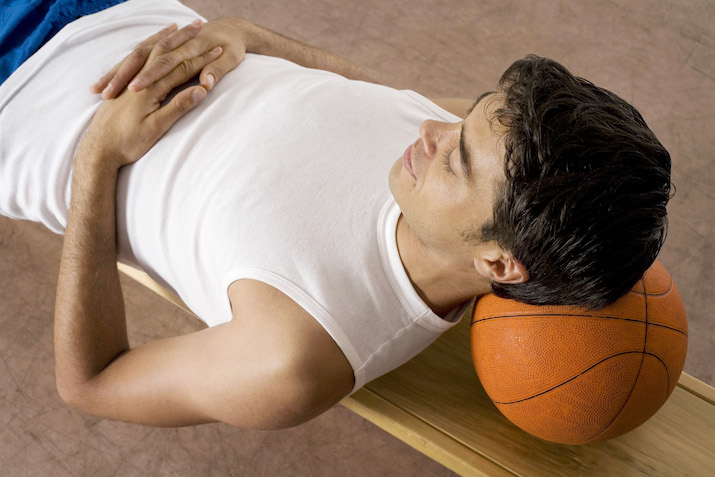Now the season is over it’s time to get focused on your future! Preparation is always the key to success. Think about what you want to achieve and achieve it during your off season training program.
What is off season training?
The off-season is a period of time when an athlete is not participating competitively. This downtime is an opportunity to workout harder in the weight-room and work on what needs to be done for your next competitive season. It is sometimes referred to as the period between the end of the in-season and about 6 weeks prior to the start of the next competitive year.
Is it important? – Yes!
- Off season training is the most important phase of any sport-specific conditioning plan.
- It will help you to recover physically and mentally.
- It can be used to address physical imbalances that are often a result of playing competitive basketball.
Reasons to do off season training
Training at the same level of volume and intensity as in-season is detrimental as this can lead to over-training and mental burnout. The goal is to get the right balance of recovery while still achieving an increase in strength and size. Alongside this, you want to maintain and develop your fitness level. Additionally, a good off season training program will focus on addressing imbalances. As a result, this will help prevent acute and/or long term chronic injuries.
Transition from playing:
- Forward to guard
- Center to wing
- Shooting guard to point guard
Also, add moves to your individual skill set. Off season training is about improving you as an individual (not about improving the team):
- Becoming a 3-point shooter
- Increasing ball handling skills
- Adding post moves
What does off season training look like?
- Practice, good quality practices
- Weight-training – focusing on building strength and size
- Flexibility training – to alleviate stiffness, with static stretches done daily
- Focus on improving foundation movement patterns
- Improving fundamental movement patterns like jumping, landing, decelerating, squatting, hinging at the hip, pushing, and pulling in order to improve overall athleticism.
- Cardio conditioning (the conditioning work done to the aerobic system in the off-season provides the base for the higher-intensity demands to come in the pre-season and competitive seasons)
- Improvement on all your skills
You simply can’t build these qualities in the middle of a competitive season. Instead, you must build these qualities in the off season so they can be shown and used during the competitive season. Remember, you are establishing a base for the future.
The improvement of your strength creates the potential to: sprint faster, jump higher and throw harder during the competitive season.
What your off-season training should consist of
- Maximal loads in good form – required for strength to develop
- Appropriate rest time between sets – necessary for maximal loads to be handled in good form
- Biggest results come from – squats on the squat rack, presses standing on two feet, and pulls from the floor with deadlifts and cleans
These are the exercises that have the most carryover to sport, they train the entire muscular-skeletal system and allows you to handle the most weight on a regular basis. You can see significant gain in size and strength because these attributes are highly trainable.
Only when these few exercises are technically mastered and trained to their fullest potential, consider adding new or more complex exercises.
Remember this: Strength is the foundation of all other athletic qualities and it is where your focus must be.
Basketball players who take advantage of the off-season to train will add value to their game.
Goals during the off season training
- Improve your strength
- Clean up your movement patterns
- Develop your aerobic energy system
During your off-season training, you want to build a solid foundation of strength. Next, learning how to use your newly developed strength gains during the pre-season and in the competitive season.
Off season training is the time to:
- Make sure you can absorb force correctly
- Clean up fundamental movement patterns
- Develop good posture
- Develop proper technique
- Transition positions
Remember to focus on these three things: weekly workouts, learning more about your sport, learning more about yourself as an athlete.
When to start off season training
Your off-season training needs to begin immediately in order to maximize your basketball performance and avoid injuries, weight-gain and getting out of shape. Moreover, you want to avoid de-training. This happens when the training stimulus is removed and physiological adaptations begin to reverse back to pre-training levels.
Difference between off season and in-season training
Off season training:
- Lift heavy to build muscle, gain weight and acclimate your body to moving with the addition body weight
- Push yourself harder
- Longer workouts
- Higher sets & reps
- Eccentric training
- Isometic holds
Goal: to get bigger and better for next season.
In-season training:
- Less time in the weight-room
- Focus on preserving your energy for practice
- Lift lighter in mornings on days you have practice and days off
- Mobility work
- Foam rolling
Goal: maximum performance output
Organized off season training vs training on your own
You will benefit more by partaking in an organized off-season training program for the following reasons:
- There is a group to push you to reach your maximum output and potential
- You have access to professionals who know what they are doing
- To reach your potential you need coaches to be able to correct and guide you through your training
- You will compete directly against other skilled players and this is the only way to get better
- Play in summer league games to put your new skills into action
- You get into a daily routine to maximize your time




